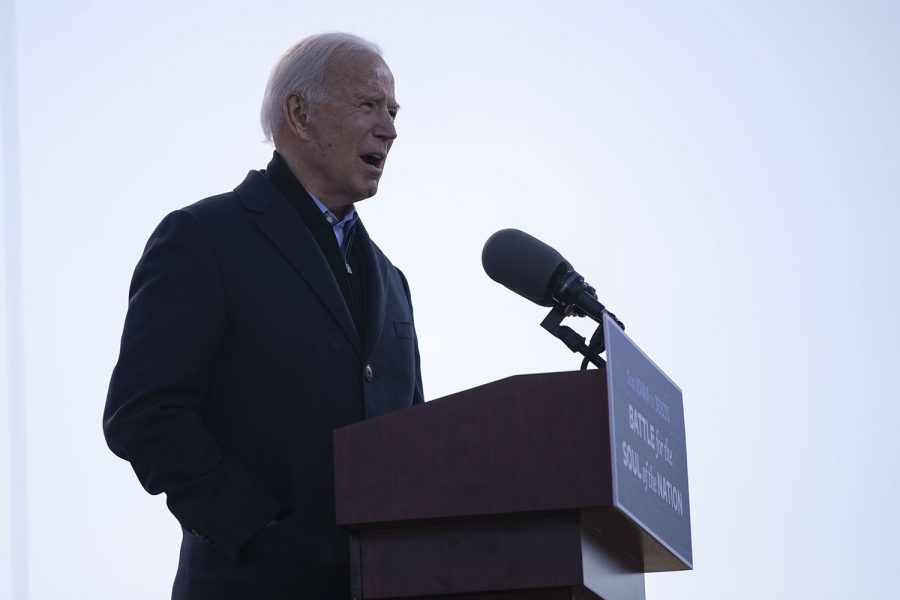Joe Biden’s presidency could bring major changes to higher education
Strengthening community colleges, addressing affordability, and changes to Title IX and immigration are among the higher-education goals of the incoming administrations.
Democratic presidential candidate Joe Biden speaks during a Biden drive-in rally on Friday, Oct. 30, 2020 at the Iowa State Fairgrounds in Des Moines. Around 200 cars parked on the grounds and a few people gathered at the front as Biden commented on a change in the presidency and promised to address issues with public health due to the Coronavirus.
December 3, 2020
While president-elect Joe Biden has yet to name a nominee for Secretary of Education, his plan for higher education could bring many changes to America’s colleges, including the University of Iowa.
Public higher education is largely funded by state governments, but they’re under the purview of the federal Department of Education, and its leadership affects the operations of colleges and universities across the country.
Biden’s Plan for Education Beyond High School puts a large emphasis on strengthening community colleges and easing the cost burden on students who pursue postsecondary degrees.
Community colleges
Biden has proposed making two-year community colleges tuition-free, something President Obama also proposed but never accomplished. The president-elect’s platform adopted a proposal from Sen. Bernie Sanders, I-Vt., to make public universities free for families that make less than $125,000 a year.
Some of that would require acts of Congress, but Biden can leverage the Department of Education using executive authority.
If more students attend community college, universities will likely need to work closely with community colleges to create a smooth transfer process from a two-year to four-year institutions, said Cassie Barnhardt, an associate professor in the UI College of Education.
“It might require places like the University of Iowa or Board of Regents to further work from a governance standpoint with the different entities in the state that also address community colleges,” Barnhardt said.
Spokespeople for both the UI and the state Board of Regents declined to comment on how specific policy changes might affect the institutions. UI Director of Media Relations Anne Bassett said the university’s core mission will guide how it implements any new policies.
“The University of Iowa is committed to providing an affordable and quality education to all of our students,” Bassett said. “We do not publicly comment on pending policy proposals, but our mission of teaching, research, and student success will guide any future actions taken in response to new policies impacting our campus.”
RELATED: Iowa regent universities report four-year decline in enrollment
Pell Grants
Biden has proposed doubling the amount of federal Pell Grants, which are grants awarded to low-income students. The maximum grant is currently set at $6,345, and Biden’s plan would increase that to $12,690. The increase will provide more funds to recipients and expand the pool of students eligible for the program, according to Biden’s website.
The Association of American Universities has recommended increasing the grants even more, advocating for the top limit to be tripled.
“Restoring the purchasing power of the Pell Grant and expanding eligibility, award size, and program benefits to aid in student success and completion are vital to renewing the promise of Pell,” the association’s recommendations read.
The association — which represents 65 American research universities, including the UI — outlined recommendations to both major presidential candidates in October. Jillian Gates, the group’s communications officer, said in an email to The Daily Iowan that the group broadly agrees with the Biden administration’s goals.
Title IX
Another item Biden’s administration is bound to treat differently are issues related to Title IX — the federal law that prevents sex discrimination in education — especially instances of sexual assault. Biden authored the “Dear Colleague” letter as vice president in 2011, which guided how colleges should handle cases of sexual assault under President Obama’s administration.
Current Education Secretary Betsy Devos has made changes to the procedure, narrowing the definition of sexual misconduct and requiring colleges to allow cross-examination of accusers. The rule also allows colleges to decide between using the “preponderance of evidence” — the basic standard for judging legal cases — or the higher standard of “clear and convincing evidence.”
Biden has criticized these changes, saying they discourage victims from coming forward, and he has vowed to roll them back once in office.
The state Board of Regents introduced a new interim policy on sexual harassment in September, which kept the preponderance of evidence standard for Iowa’s three public universities. The board also instituted a formal process for sexual assault cases including a live hearing and questioning for both parties.
Regents spokesperson Josh Lehman declined to comment on whether the regents would change standards for Title IX cases under a Biden administration, saying the regents don’t comment on legislation until specific language has been introduced.
Gates said the Association of American Universities has called on Biden to roll back the Trump administration’s changes to Title IX.
“The recommendations included rolling back changes to Title IX to ensure that colleges and universities can effectively, fairly, and compassionately address the problem of campus sexual assault,” she wrote in an email. “Of particular concern is the mandate for a live hearing with cross-examination, which has a chilling effect on reporting campus sexual assault and misconduct.”
RELATED: Third time’s the charm: Joe Biden’s long road to the White House
International students and immigration
International student enrollment has been shrinking nationwide in recent years, and the trend has worsened because the ongoing pandemic. International enrollment at Iowa’s three public universities governed by the state Board of Regents has declined by 45 percent in the last five years, with the most significant drop in students from China. From 2019 to 2020, 26.3 percent fewer students from China enrolled at the three universities.
While Biden hasn’t outlined specific policies related to international students, his campaign promises and immigration proposals represent a distinct shift away from the inflammatory immigration rhetoric of the Trump administration.
Biden is planning to roll back many of Trump’s more controversial executive orders, according to the Washington Post, including a ban on immigration from some majority Muslim countries, which affected international students and scholars from those countries.
The Association of American Universities has also recommended that the administration create a new green card category to allow international students completing doctoral and STEM degrees to enroll more easily in American institutions, Gates said.
Biden has also pledged to reinstate the Obama-era Deferred Action for Childhood Arrivals program, which provides protections for undocumented immigrants brought to the U.S. as children — a group known as Dreamers.
Biden wants to expand DACA and allow Dreamers to receive federal student loans and Pell Grants. Barnhardt said she anticipates a return to pre-Trump policies on the issue.
“We can expect to see some of the policies of the Biden administration to be more similar to the policies associated with the Obama administration with respect to undocumented students,” the professor said.






